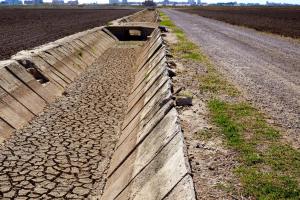Around 3.6 billion people live in contexts that are highly vulnerable to climate change and many of them are in transboundary basins. Droughts do not recognize borders, pose transboundary risks, and require cooperation to address them. The 6th IPCC assessment (2022) and the IPCC synthesis (2023) reports recognize transboundary risks as an important challenge affecting the food, energy and water sectors, requiring climate-informed transboundary management.
As global temperatures continue to rise – with 2023 the hottest year on record – the Synthesis Report of the IPCC Sixth Assessment Report identified substantial damages, and increasingly irreversible losses, to freshwater ecosystems due to climate change. Heavy precipitation and droughts have further increased.
In 2023 long-term drought persisted in north-western Africa and parts of the Iberian Peninsula, as well as parts of central and southwest Asia, and intensified in many parts of Central America, northern South America and the southern United States. Zambia’s government declared this month a national disaster and emergency due to severe drought which has decimated food production and power generation. Droughts and water scarcity do not distinguish between Global North and South and their impacts are only intensifying.
The Convention on the Protection and Use of Transboundary Watercourses and International Lakes (Water Convention), serviced by UNECE, addresses droughts via its programme areas on climate change adaptation and integrated and intersectoral approach to water resources management –
particularly, within the framework of its Task Force on Water and Climate and the Global network of basins working on climate change adaptation. The Convention, together with partners, supports countries in transboundary basins and river basin organisations in developing and implementing transboundary adaptation strategies and plans which address drought risk management.
To help countries sharing transboundary waters to more equitably and sustainably allocate limited water resources, a new Summary Handbook on Water Allocation in a Transboundary Context developed under the Water Convention offers a targeted practical resource for policy and decision-makers. It provides key elements, frameworks and modalities to consider in the application of transboundary water allocation, while recognizing that every allocation context is unique. It offers key information from the full Handbook on Water Allocation in a Transboundary Context adopted by the Convention’s 9th Meeting of the Parties in 2021, covering the global practice of transboundary water allocation. Enriching the wide array of case studies from different regions included in the Handbook, the Summary Handbook features new practical examples from Southern Africa and Central Asia.
Cooperation on shared waters can help to improve preparedness to climate related extremes and, particularly, to droughts, for example through the development of shared information systems or data exchange across sectors, enlarging the range and location of available measures, and sharing costs and benefits.
Seeking to foster strategic exchanges of approaches, best practices and lessons learned in addressing droughts in transboundary basins, the Water Convention recently brought together water, agriculture, climate and environment communities as well as drought experts for a Global Workshop on Droughts in Transboundary Basins (26-27 February 2024).
The Workshop was organized under the auspices of the Water Convention serviced by UNECE, under the leadership of the Netherlands and Switzerland, in cooperation with UN Convention to Combat Desertification, United Nations Office for Disaster Risk Reduction, World Bank, World Meteorological Organisation and the International Network of Basin Organisation
Preliminary conclusions included:
-
Transboundary cooperation is crucial in drought management since more than 60% of freshwater flow is shared by two or more countries. Transboundary cooperation helps prevent maladaptation, but can also make drought management more effective by sharing data and resources and locating measures where they have the optimum effect;
-
Future transboundary agreements should consider hydrological changes and extremes such as droughts, and be developed in a flexible and adaptable way;
-
In the face of increasing droughts, aquifers are being increasingly exploited, but groundwater use should be sustainable;
-
Increased funding and financing for drought management is needed, from national and international sources.
The workshop was followed by the fourteenth meeting of the Task Force on Water and Climate under the Convention on 28 February 2024, which reviewed all climate change activities and future plans under the Convention. This provided an opportunity to address the COP 28 decision on the Glasgow–Sharm el-Sheikh work programme on the global goal on adaptation (GGA) which includes water as the first target, and also refers to inland water ecosystems, highlighting that climate change impacts are often transboundary in nature and can benefit from climate-informed transboundary management. Another COP28 decision on the outcome of the first global stocktake recognizes the crucial role of international collaboration, including transboundary cooperation, in addressing climate change impacts and contributing to progress towards the goals of the Paris Agreement.
Based on these decisions, the Task Force asked the secretariat under the guidance of the co-chairs to develop an action-oriented document on how transboundary aspects of water management can be mainstreamed into national climate documents such as, for example, Nationally Determined Contributions (NDCs) and National Adaptation Plans (NAPs).
These developments come just prior to the World Water Day 2024, which is celebrated annually on 22 March. The theme for 2024 is “Water for Peace” and will see the launch of the United Nations World Water Development Report (WWDR) on this same topic.


